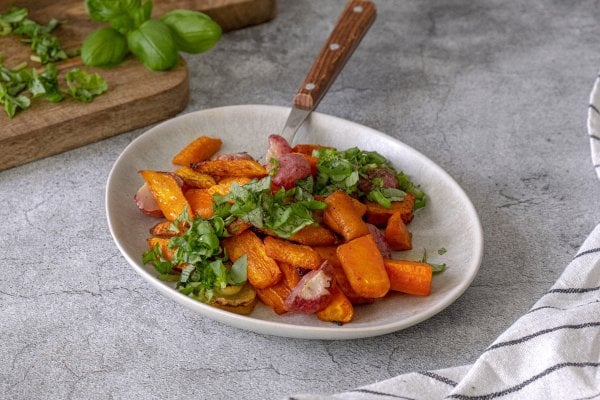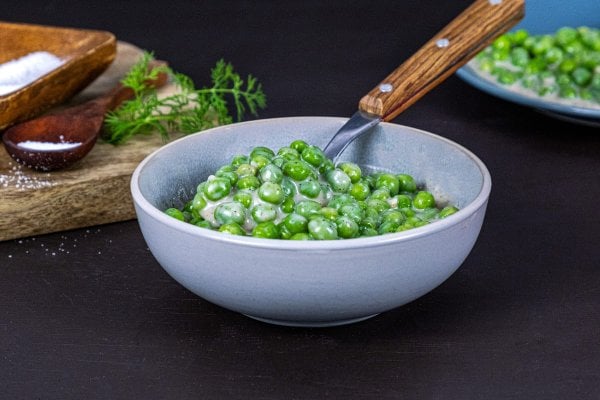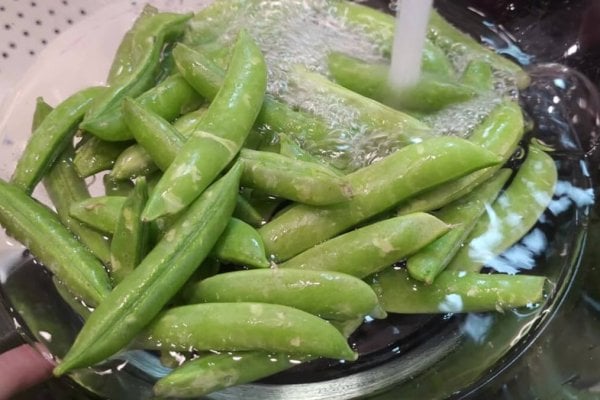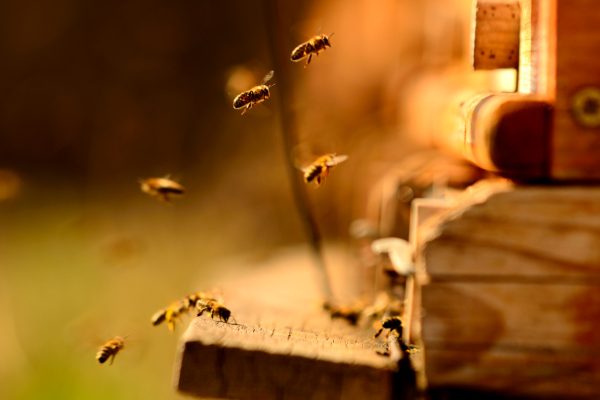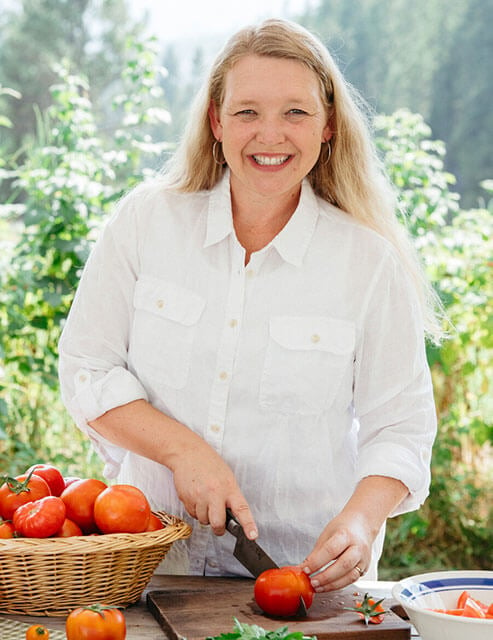



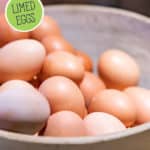
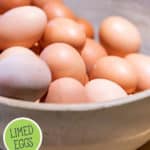

Learn how to preserve fresh eggs by water-glassing eggs for easy, long-term storage. You can cook and eat water-glassed eggs just like fresh eggs, and the taste and texture are nearly identical.
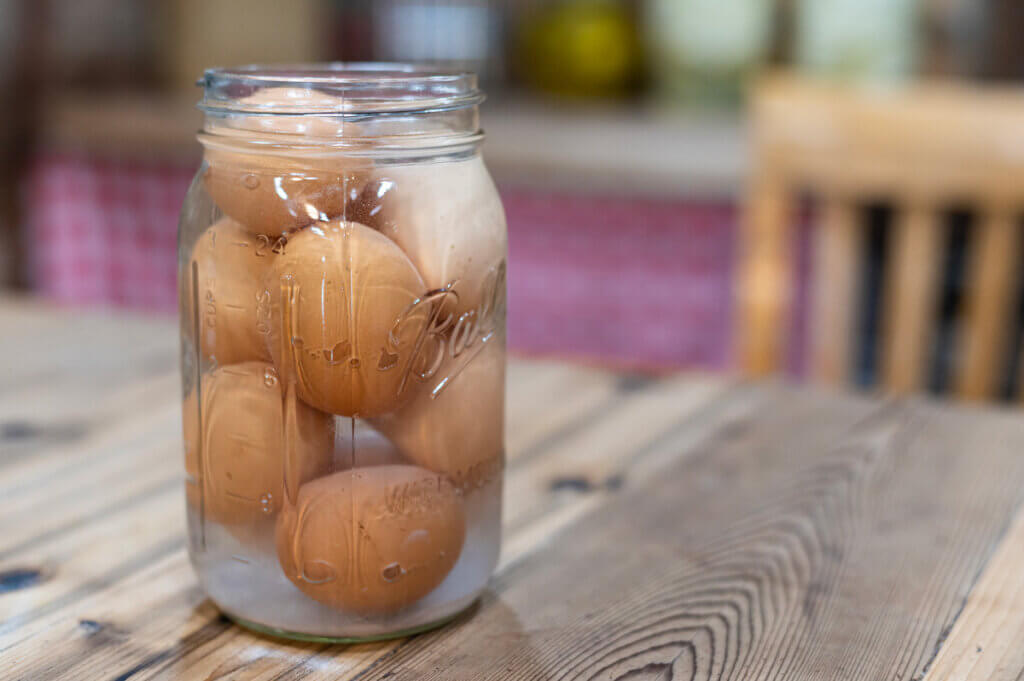
Funny enough, water-glassing eggs is probably how many of you found Homesteading Family! It continues to be one of our most viewed YouTube videos to date.
Water glassing is an easy and affordable way to preserve eggs at home. In this guide, I’ll walk you through the process step-by-step so that you can safely and effectively water glass eggs in your own kitchen. With a little bit of effort, you can enjoy farm-fresh eggs, even when your hens stop laying.
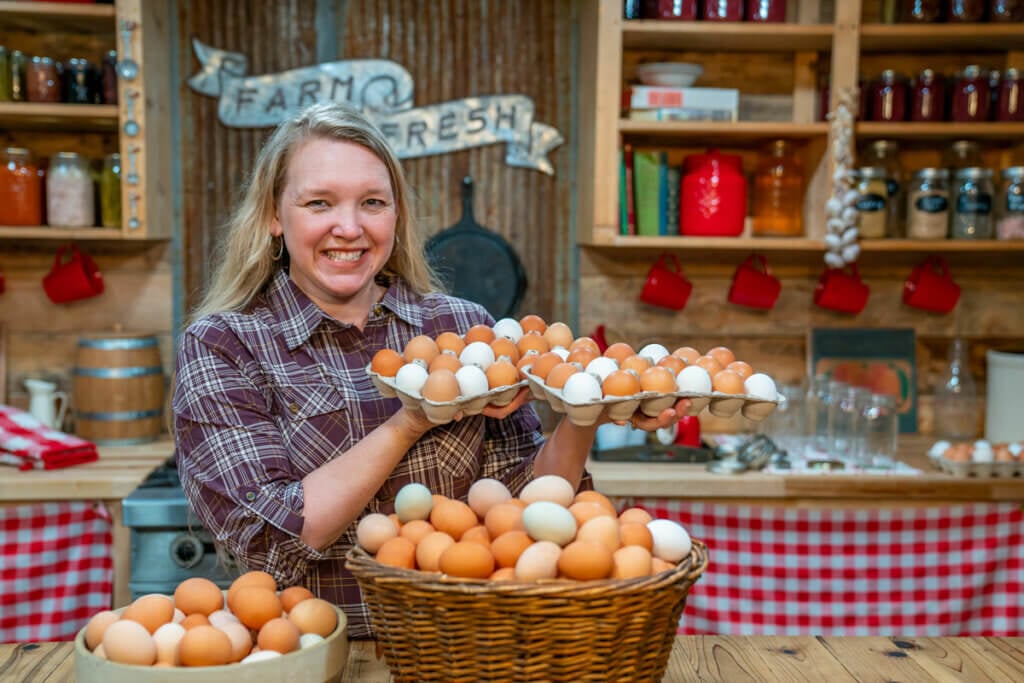
Why I Love Water-Glassing Eggs
If you’ve raised backyard chickens for any amount of time, you know their production picks up significantly in the spring as the daylight hours increase. Because we allow our chickens to slow their production over the winter (as is natural for chickens), we like to preserve our extra eggs in the spring to last through the slower winter months.
When farm fresh eggs are preserved and properly stored (like freezing raw eggs, freeze dried eggs, and homemade egg noodles), you can really benefit during the winter months. If you want even more methods for preserving your extra eggs, check out our Egg Preservation Class!
Though properly handled farm-fresh eggs last quite a while on the shelf, they won’t last indefinitely (or anywhere near a year), this is why water-glassed eggs have become our preferred egg preservation method. Not only will they last up to 18 months, but they taste just like a fresh egg with a near identical texture.
Is Water Glassing Eggs Safe?
Before we start water glassing our eggs at home, it’s important to know whether this preservation method is safe. The answer is yes, as long as you follow the correct steps and take proper precautions.
Water glassing is an age-old method of preserving eggs, and when done right, it can be a safe and effective way to store eggs for up to 18 months. However, it is crucial to use clean, unwashed eggs and only food-grade hydrated lime in the process.
It’s also essential to store the preserved eggs in a cool, dark place and to check them regularly for any signs of spoilage. If you notice any rotten eggs, be sure to discard them immediately to avoid the risk of food poisoning.
Remember, it’s always better to be safe than sorry. Take the necessary precautions and follow the recipe closely to ensure your water glassed eggs are safe to consume.
While water-glassing eggs at home may seem daunting, it’s a simple and safe preservation method that allows you to enjoy fresh eggs throughout the year. Now that we’ve cleared up any safety concerns, let’s move on to the taste and texture of water-glassed eggs in the next section.
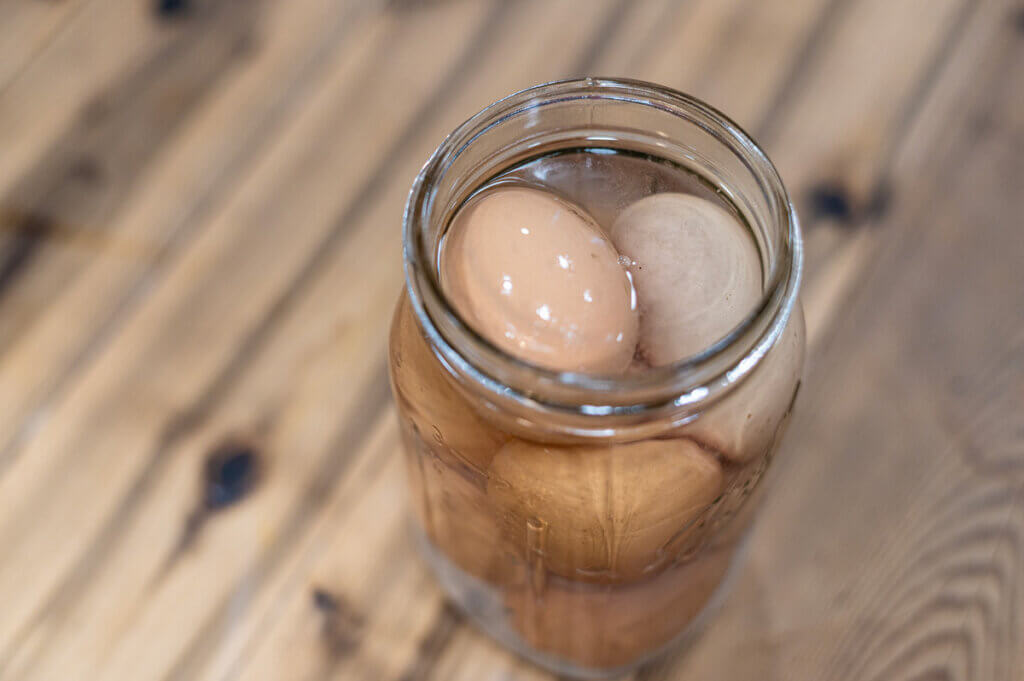
Does Water Glassing Eggs Really Work?
Before we get too deep into the topic, I know many of you are wondering if this egg preservation method really works. Let me share this 12-month update video with you as I crack open a one-year-old egg next to a fresh egg, straight from the coop.
Do Water Glassed Eggs Taste Different?
One of the most common questions people have about water glassing eggs is whether they taste different from fresh eggs. In my experience, water glassed eggs have a slightly different taste and texture compared to fresh eggs, but it’s not necessarily a bad thing.
Take a look at the photo below. Can you tell which egg is fresh and which has been preserved for 12 months? Did you guess the egg on the left is fresh? The only difference when preserving eggs is that the white gets a little bit cloudy, and the yolk is a little “flatter.”
Water-glassing eggs can result in a slightly firmer texture once cooked and a more intense flavor. Some people describe the taste as richer and more savory. However, the difference in taste is subtle and may not be noticeable to everyone. I tested this by scrambling some water-glassed eggs along side some fresh eggs, only adding salt, and did a blind taste test with Josh. He couldn’t tell the difference!
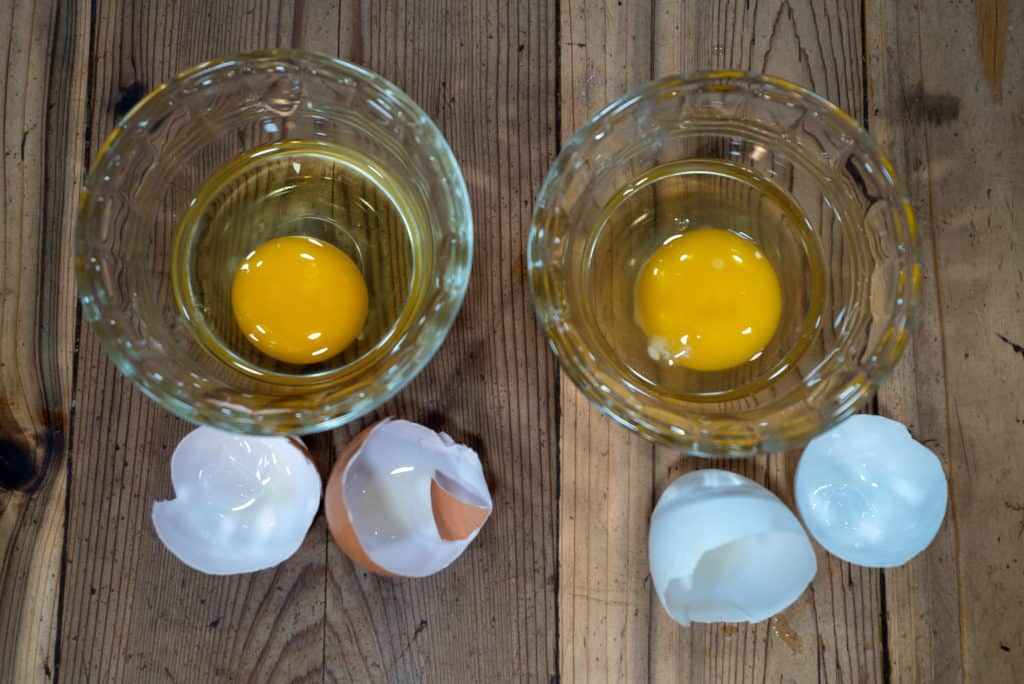
Homesteading Hack: If you’re not sure whether water glassed eggs are right for you, try preserving just a few eggs and see how you like the taste. You can test them after a month or two.
It’s worth noting that the taste of water glassed eggs can also vary depending on the storage conditions. If the eggs are stored improperly, they may develop a sulfuric taste and odor.
| Fresh Eggs | Water Glassed Eggs |
|---|---|
| Soft and tender texture when cooked | Firmer texture when cooked |
| Mild taste | More intense flavor |
| Short shelf life | 18 months of extended shelf life |
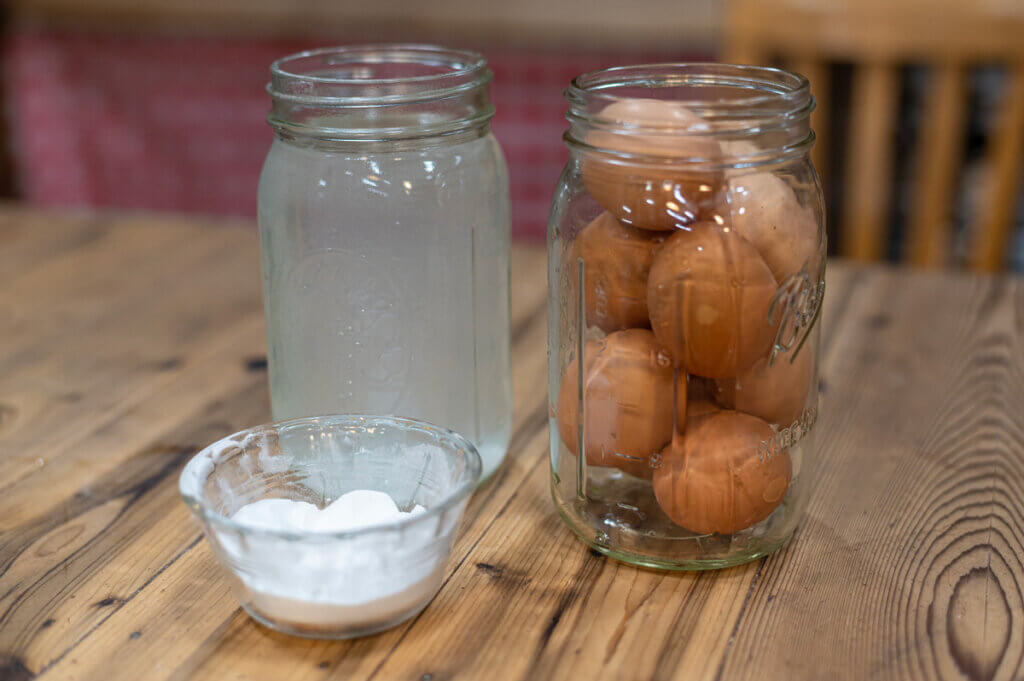
How to Water Glass Eggs
Preserving eggs with water glassing is a simple process that requires just a few ingredients. Follow this recipe for successful water glassing of your eggs:
Supplies & Ingredients
- Storage Container – We like to use a combination of food-grade five-gallon buckets, gallon-sized glass Mason jars, and half-gallon-sized glass Mason jars.
- Hydrated Lime – It’s important that you use hydrated lime (calcium hydroxide) for this recipe. Look for food-grade hydrated lime with no additives or preservatives. You may find hydrated lime under these common names: calcium hydroxide, pickling lime, or slack lime. If you can’t find hydrated lime locally, you can find pickling lime here.
- Eggs – Always start with clean, unwashed eggs. Make sure there are no cracks or damages to the shells. If the eggs are dirty, wipe them gently with a dry cloth. If they don’t come clean, it’s best to use those eggs for fresh eating and preserve only the cleanest unwashed eggs.
- Water – We recommend using filtered or distilled water for this preservation method if you’re on city water.
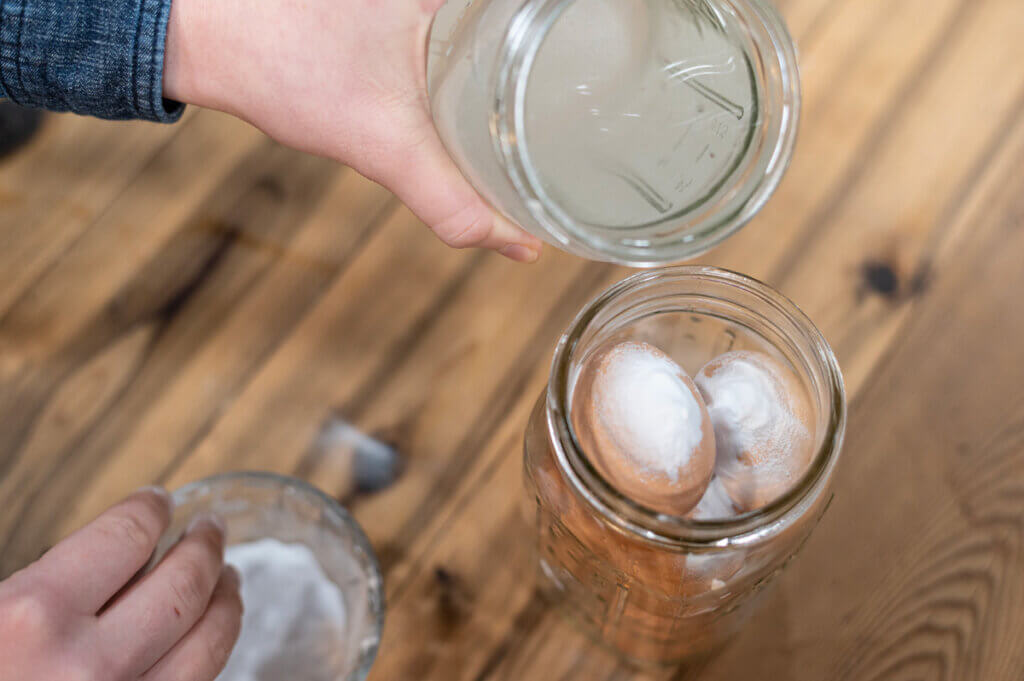
Step-By-Step Directions
- Start with clean, unwashed eggs. Ensure there are no cracks or damages to the shells.
- Depending on how much lime solution you need, the ratio will always be the same. Mix one ounce food grade hydrated lime with 1 quart of cool water.
- Stir well until the lime has dissolved.
- Carefully place your eggs into your food grade container and pour the lime-water solution over your eggs, submerging them completely.
- Cover the container, label with the date and store in a cool, dark place for up to 18 months.
When ready to use, take the eggs out of the solution, rinse with water, and use as you would fresh eggs.
Homesteading Hack: It’s important to note that the longer the eggs sit in the solution, they will begin to absorb some of the preserving solution. Some say this affects the taste slightly, however, to us it’s barely noticeable.
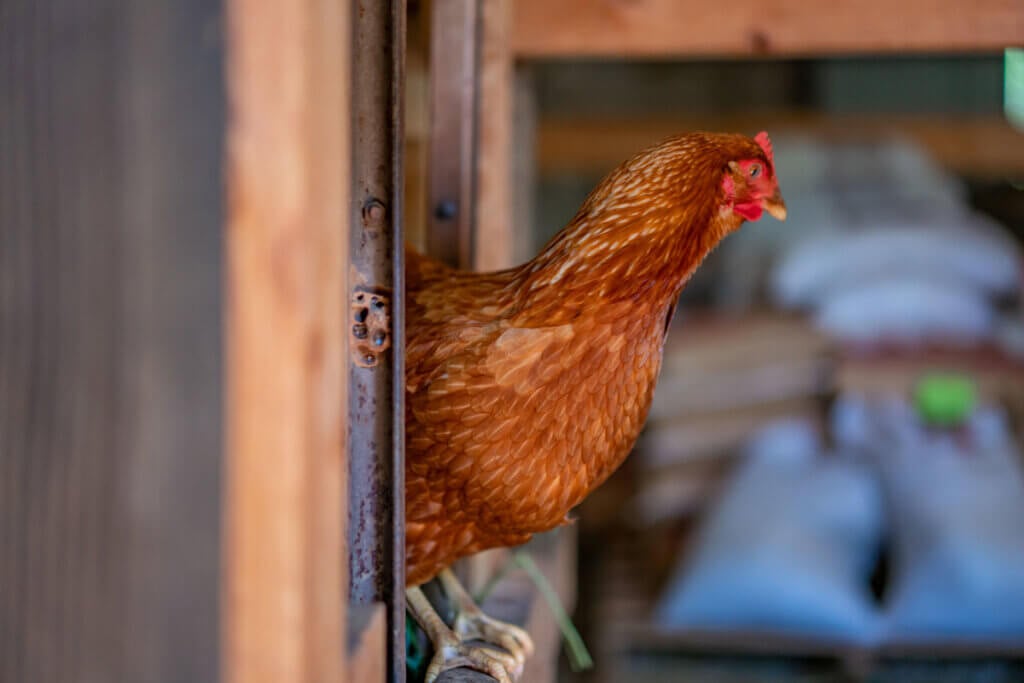
The Importance of Clean, Unwashed Eggs
When it comes to water-glassing eggs, using clean, unwashed eggs is crucial for the preservation process. Dirty eggs can lead to bacterial contamination, which can cause the eggs to spoil, even when preserved.
I recommend collecting fresh eggs from your chickens and wiping them clean with a dry cloth. Avoid washing the eggs with water as this can remove the protective layer that naturally covers the eggshell. If you use eggs that have been washed, they may not preserve as well.
Homesteading Hack: If your eggs are especially dirty, try gently dry brushing them with a soft-bristled brush to remove any particles before wiping them clean with a dry cloth.
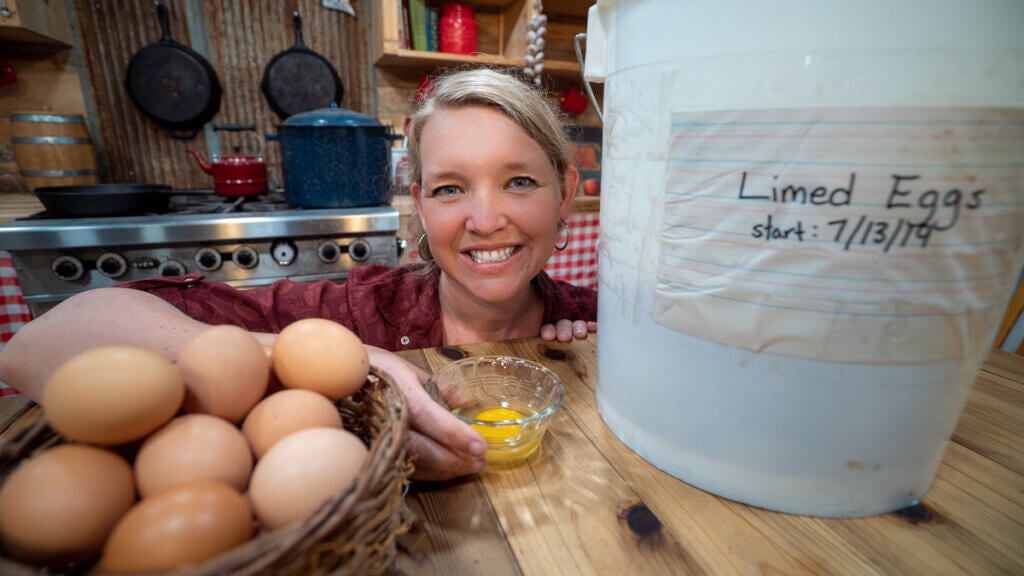
What is Hydrated Lime?
Hydrated lime is usually a combination of oyster shells, bones, and limestone that have been burned in a kiln, then hydrated with water. That’s it! It’s a very natural product, not synthetic, and completely safe to use.
Homesteading Hack: Do note that hydrated lime will be very different than the lime you’d find in your agricultural section at the local hardware store, so be sure you’re sourcing the correct product.
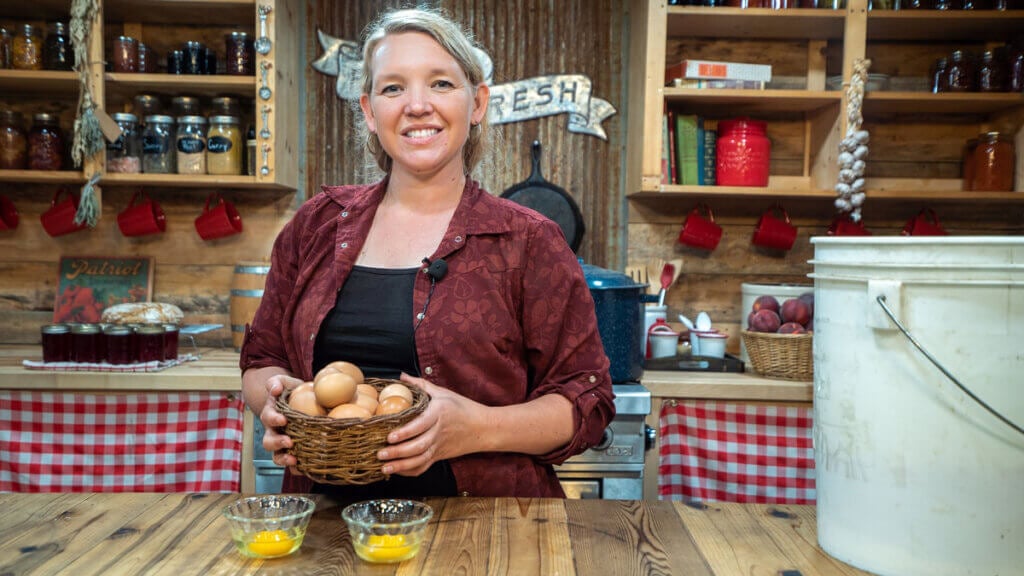
How do you store preserved eggs?
You’ll want to avoid evaporation. But the good news is you don’t need any special storage space for this method. No cold storage, root cellar or basement is needed. Just find the coolest part of your house, where it’s away from direct sunlight, and you’ll be good to go.
You want to avoid extreme heat and/or freezing temperatures, so if you’re storing eggs in a garage, you’ll want to ensure you live in a place with pretty steady temperatures.
Storing Tips for Longevity
Proper storage is crucial when it comes to enjoying your water glassed eggs for an extended period. Here are some tips to help you store your preserved eggs correctly:
- Place eggs in a cool, dark place: Water-glassed eggs should be stored in a cool environment, away from sunlight and heat sources. A pantry or root cellar is ideal for storing your preserved eggs.
- Store eggs upright: When storing water-glassed eggs, keep them upright with the small end facing down. This helps prevent the air pocket from expanding and allows the egg to remain fresh for longer.
- Rotate your egg stock: To ensure the longevity of your water-glassed eggs, it’s essential to use them in a timely manner. Some people like to use multiple smaller jars for this reason, to be able to label the jars with the preservation date and use the oldest eggs first.
- Avoid washing eggs before use: To maintain the quality of your water-glassed eggs, it’s best to avoid washing them until you’re ready to use them. Water can penetrate the eggshell and compromise the preservation process.
With proper storage and handling, your water-glassed eggs can last up to 18 months. Enjoy fresh eggs year-round by using this simple preservation method.
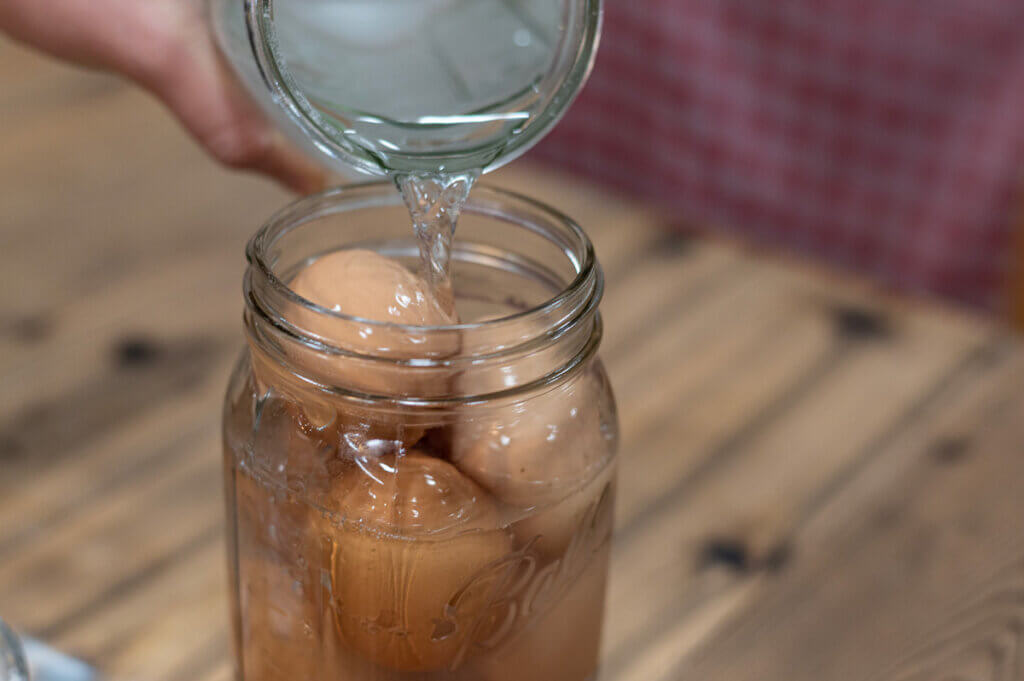
How Long Do Water-Glassed Eggs Last?
Our percentage of success rate for our water-glassed eggs at eight months is 100%. Ultimately, eight months to a year is all I want to get out of this preservation method, but some people have noted that even after two years, their eggs are perfectly fine to use!
I did put it to the test with a small sampling of eggs for 18 months and still had great success. We’re not looking to preserve our eggs forever, just to get us through the slump of the winter season.
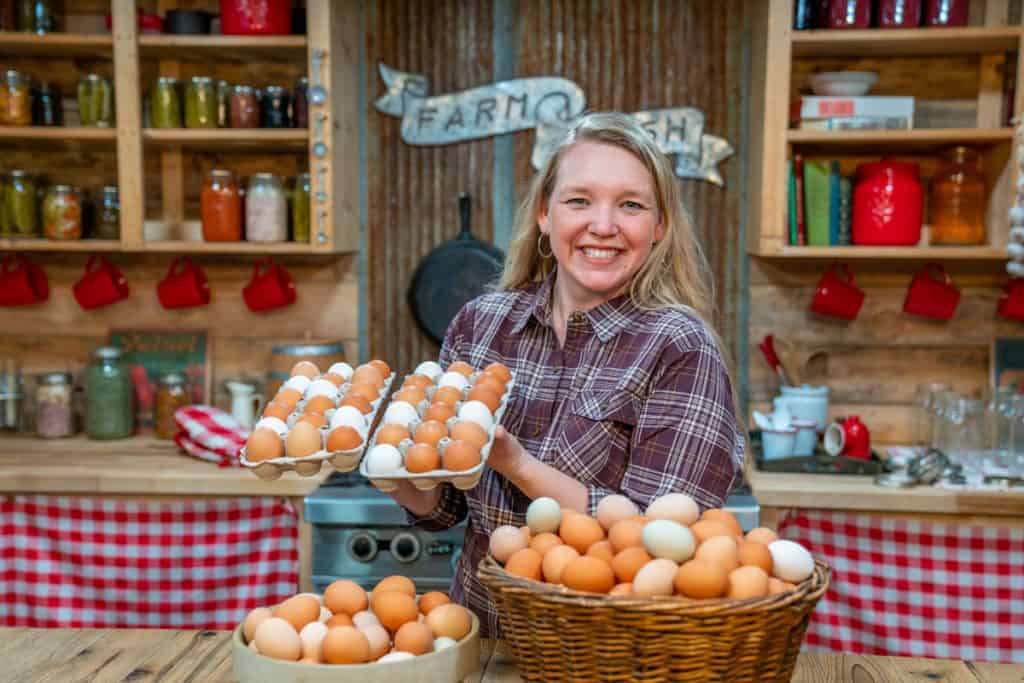
Water Glassing Store-Bought Eggs vs. Farm Fresh Eggs
When it comes to water-glassing eggs, you may be wondering if you can use both store-bought eggs and farm-fresh eggs. The short answer is no; you should not water glass store-bought eggs.
Store-bought eggs are often washed, which removes the protective layer on the eggshell, making them more susceptible to bacteria. Farm fresh eggs, on the other hand, are typically unwashed, and their natural protective coating remains intact. This additional protection minimizes the risk of bacterial infection during the preservation process.
Additionally, store-bought eggs may have been sitting in a warehouse or on a store shelf for an extended period before you purchase them. This may affect the quality of the egg and its ability to be preserved successfully. Farm-fresh eggs, on the other hand, are typically much fresher and unwashed, increasing the likelihood of successful preservation.
I hope this guide has been helpful in providing you with a comprehensive understanding of water-glassing eggs. Give it a try, and you’ll soon see how it revolutionizes your egg preservation journey. Enjoy your fresh eggs, and happy preserving!
FAQ
Yes, water-glassing eggs is a safe method of preserving eggs. When done correctly, it can help you store eggs for up to 18 months.
Water-glassed eggs maintain their taste and texture similar to fresh eggs. There are no significant differences in flavor.
Eggs preserved using water glassing can last for up to 18 months when stored in a cool and dark place.
Clean, unwashed eggs are essential for successful water glassing. They have a protective layer called the cuticle, which helps prevent bacteria from entering the egg and ensures better preservation.
Hydrated lime is used in water glassing as it helps create an alkaline solution that preserves the eggs by preventing bacterial growth.
It is recommended to use filtered water instead of city water for water glassing. Filtered water reduces the chances of contamination and produces better preservation results.
No, you should not water glass store-bought eggs because they have likely been washed. Unless you know 100% that you’re purchasing unwashed, farm-fresh eggs from the store, it’s best to avoid grocery-store eggs.
If you’ve ever smelled a bad egg, you know it! When water-glassing eggs, I do notice that the egg solution doesn’t smell “good,” but it also doesn’t smell “bad.” You’ll want to keep an eye out for any floating eggs and discard them. Also, any eggs that have been cracked or broken open. Otherwise, use your nose when cracking your water-glassed eggs, it will tell you if it’s good or not.
Yes, this is completely normal. The solution of lime to water is heavier than necessary, so some settling is normal. You do not need to worry about stirring it back into the water solution.
No, this does not pickle the eggs. The end result is a raw, usable eggs.
Yes, the lime solution is a high ph and can really dry out your hands. In the video above I didn’t wear gloves, but I did experience a little bit of dry skin afterward. If you have sensitive skin, please wear gloves. When buying a bag of lime there will be warnings all over the bag. Understand this is because typically speaking, this kind of lime is used in construction sites where the bags will be getting thrown around and the dust particles going into the air. The way we’re using the lime is on a much smaller scale. But do take necessary precautions not to inhale the powder.
It’s actually not good to eat the lime, this is why we wash off each egg before using them. This is also why it’s so important to only preserve eggs that haven’t been washed before preserving. They have a natural protective layer that will keep the lime solution from being absorbed into the egg.
You can buy a pickling lime here! It will work just the same as the hydrated lime.
This is likely due to an egg that may not have been preserved right away, maybe they weren’t quite as fresh as you thought.
No! After eight months of storage on the shelf, my eggs tasted just the same as a fresh egg. But if they sit for over a year or more, they’ll slowly start to take on a little bit of the lime solution flavor. They’ll still be perfectly fine to use in baking, but you may not enjoy it as a fried egg.
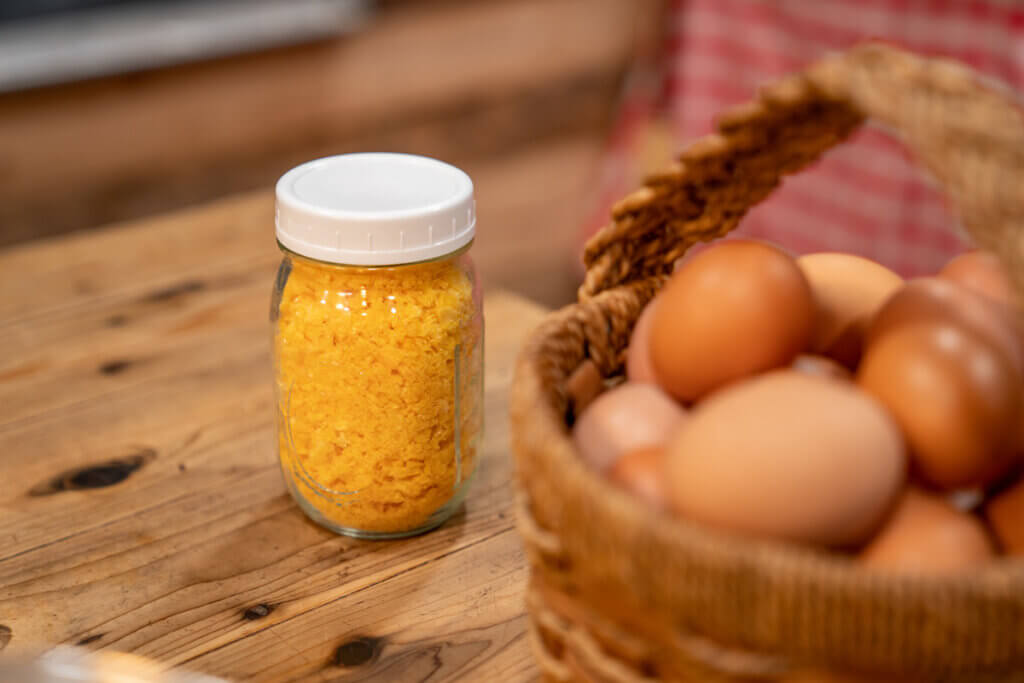
Other Egg Preservation Methods:
- How to Preserve Eggs (FREE GUIDE)
- Instant Pot Boiled Eggs | Perfect Hard Boiled Eggs Every Time
- 5 Ways to Use or Preserve Eggs
- Freeze-Dried Eggs – Everything You Need to Know
- How to Freeze Eggs
- Homemade Eggnog Recipe
- Pickled Eggs
- Easy Homemade Egg Noodles Recipe
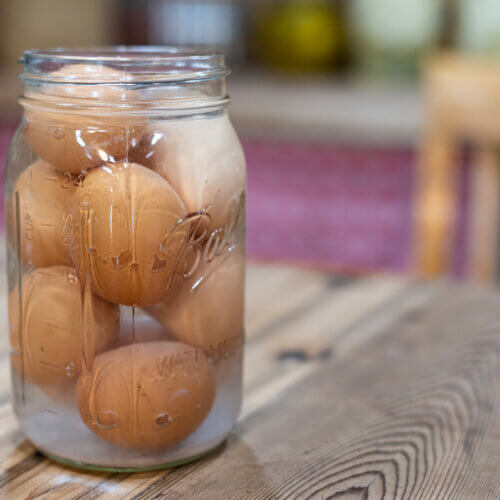
Water Glassing Eggs
Equipment
- Half-Gallon Mason Jar
Ingredients
- 1 oz Hydrated Lime
- 1 quart Filtered Water
- 8 Fresh Eggs Make sure they are clean with the bloom still fully intact.
Instructions
- Start off with a clean vessel to store your eggs. Depending on how many eggs you want to preserve will determine the size of your container.
- Gently add your unwashed fresh eggs. (Remember to position them with the pointed side down (the smaller side of the egg).
- Measure out your water and lime. The ratio of water to lime is for every one quart of water you’ll use 1 ounce of lime. No matter what size container you’re using, this is the ratio to follow.
- Add the lime to your clean water and whisk until completely dissolved. The water will look milky white.
- Pour lime water over eggs until they're covered. You can always add more lime water and eggs later on if your vessel isn't full.
- When you’re ready to use your eggs, simply remove them, give them a good rinse and use as normal.
Video
Notes
- Scale this recipe up for however many eggs you want to preserve. We usually multiply by eight and use a 5-gallon bucket for a large batch.
- We point eggs down because there’s an air pocket in each egg, so if you have it going toward the largest size, it’s not touching as much of the egg white, and you’ll end up with a better-quality egg.
- The biggest concern with water-glassing eggs is evaporation. You don’t want your lime water evaporating and exposing your eggs, especially if you’re storing them in the basement, where you might forget about them.
- One way to keep evaporation from happening is to use a container with a lid. If your container doesn’t have a lid, add a layer of olive oil over the top of the water, then cover it with a towel to keep any bugs or insects out.











